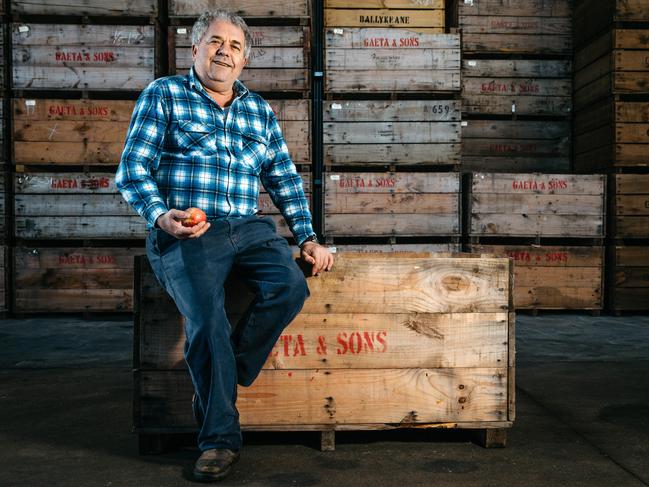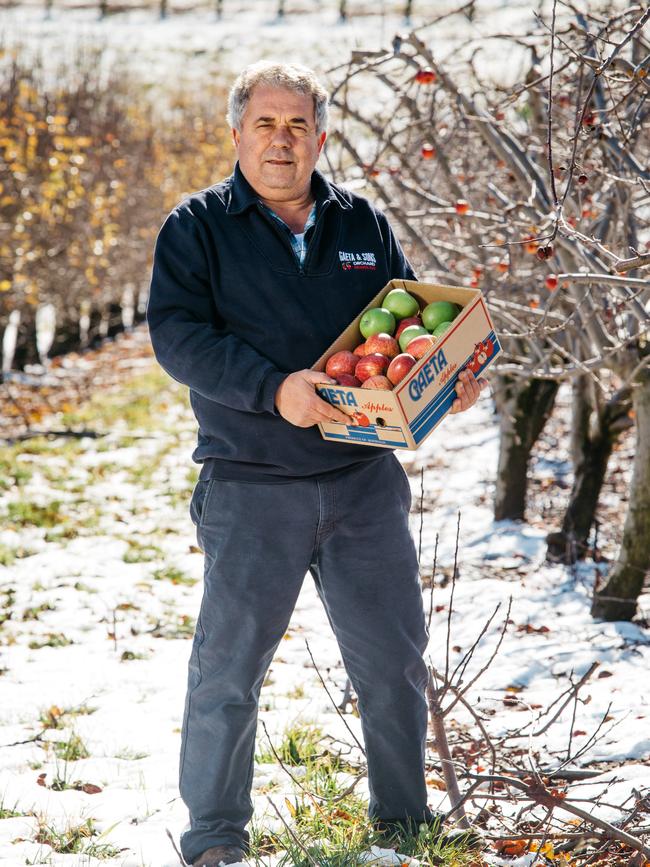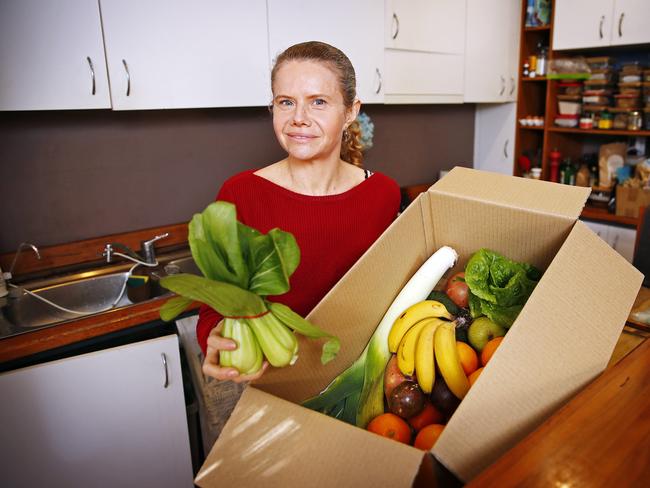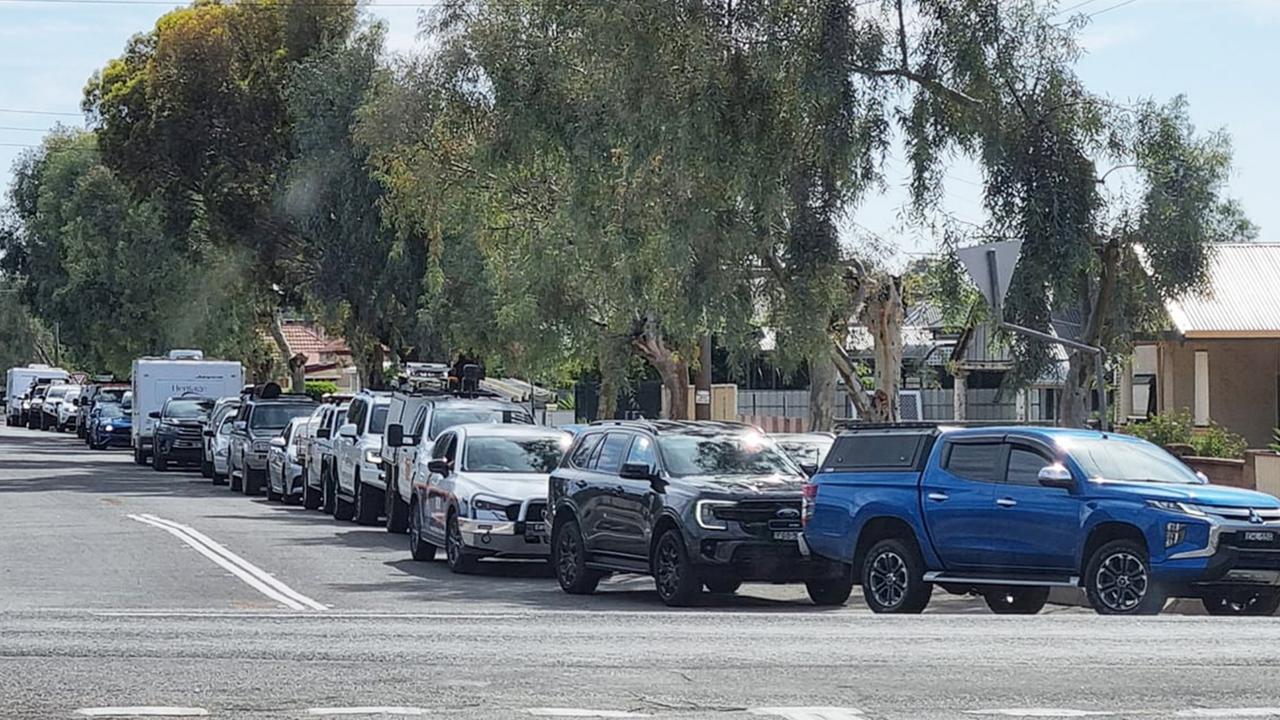Cost of living: Farmers say they get no benefit from grocery price increases
Huge increases in grocery bills are hitting shoppers hard, but farmers say none of the extra money is heading their way, instead blaming supermarkets for ‘ripping off farmers and consumers’.

NSW
Don't miss out on the headlines from NSW. Followed categories will be added to My News.
Farmers say they are not to blame for the price of groceries and angry customers should instead point the finger at the supermarkets.
“The bottom line is, if we were getting $10 for a lettuce, we would be driving Ferraris,” NSW Farmers horticulture committee chair and farmer Guy Gaeta said.
“We’re not making the money.
“The chains — they are ripping the farmers off and they are ripping the consumer off.”
However, both Coles and Woolworths have said they are working with suppliers to keep prices down, and doing all they can to take the pressure off families.

Mr Gaeta, who produces apples and cherries, said farmers were frustrated the wholesale price of produce wasn’t rising in line with the cost of fuel, fertiliser and transport.
Rather than setting their own prices based on associated costs, farmers were “price receivers”, meaning they often worked to fixed prices when dealing with major supermarkets, Mr Gaeta said.
He said the price hikes at the register weren’t flowing through to farmers, and better deals could be found at markets.
“Capsicum, for instance, are about $19 a kilo at the supermarkets and I bought it for $4 a kilo (at the markets),” he said.
He said he sells cherries for $10 a kilo at the markets, while the supermarkets sell the same product for $35 a kilo.
Another apple grower, who wished to remain anonymous for fear of losing their supermarket contract, said they received $2.50 per kilo for Pink Lady apples that were sold on the shelves for $10.99 a kilo.

National Farmers’ Federation economist Ash Salardini said myriad factors contributed to the price rise at the checkouts.
“On farms we are making food in such a manner that we can export around the world and compete with every other country in the world, but by the time it gets to the supermarket shelf, it becomes some of the most expensive in the world, so those two things don’t marry up,” he said.
There were easily identifiable factors contributing to rising grocery prices.
“Globally there is a shortage of food, crops were below average in the northern hemisphere and you have the Ukraine conflict, which has put about 40 per cent of wheat production in jeopardy and also canola oil,” Mr Salardini said.
“The other set of issues is an energy issue and that impacts fertilisers, which are energy-intensive to make, so costs have gone up between 150 to 200 per cent.
“There are workforce shortages and the cost of freight has gone up exponentially, so it all adds up to food price inflation.”
The Reserve Bank of Australia confirmed price increases on many grocery items. About 70 per cent of the CPI basket had an annual inflation rate above 2.5 per cent in the quarter, “which is comparable to the levels seen during the period of elevated inflation in Australia prior to the Global Financial Crisis”.
Mr Salardini said the market power of the two giants, Coles and Woolworths, was also playing a role.
“Prices are going up and costs are going up, that is a fact, but more generally they (supermarkets) are taking the mickey because they have market power,” he said.
“There are two organisations that control about 70 per cent of the grocery market, so they squeeze every cent out of the farmer and they squeeze every cent out of the consumer as well.
“Regardless of Covid, regardless of the Ukraine conflict, we were paying some of the highest grocery prices in the world prior to all this, and that is weird when we produce cost-effective food by global standards, so yes, they are taking the mickey.”
Yet that does not translate into top dollar for farmers.
Coffs Harbour farmer Paul Shoker produces avocados, bananas and cucumbers to sell to wholesalers and major supermarkets.
“I‘ve been full-time producing for about 15 years now and in my lifetime I have not seen a situation before where every input cost I can think of has gone up,” Mr Shoker said.
“The freight companies, the supermarkets they can put their prices up but we can’t — well, we can, but we would have simply no one to buy off us,” he said.
“The frustration a lot of farmers feel is that they are absorbing these costs but aren’t recouping them from the supply chain.
“I think a lot of farmers will be struggling to break even this year, a lot will be running at a loss.”
Mr Shoker said he understood that with everyone facing rising costs of energy, fuel and labour the retail price had to go up, but wished more was passed on to producers.
“If there is a silver lining out of this I hope it makes people realise and appreciate produce.
“Quite often people are willing to pay $30 a kilo for chocolate and $20 a kilo for crisps, but when it comes to fruit and vegetables they expect it to be $1.99 a kilo, so I hope it makes people realise the cost to grow things,” he said.
A spokesman for Woolworths said costs were increasing due to a number of factors, including higher prices for raw materials, transport and weather-related impacts on vegetables.
“We are now seeing four to five times as many requests from suppliers for price adjustments,” he said.
“In May, we reduced the price of more than 300 traditional winter products until August through our Prices Dropped program. We’ve also recently introduced more than 650 own brand products to our Low Price program, which means customers can expect the prices of these products to remain consistent for an extended period.”
A spokesman for Coles said the company’s key focus was keeping the cost of the family shop down.
“We appreciate that there are a number of factors driving inflation for all retailers. However, there are a number of ways in which we deliver value to customers. This includes weekly specials (and) our Down Down and Everyday prices, which offer key staples at trusted pricing for the longer term,” he said.
“This financial year to date, we have reduced prices on well over 2000 items across our range of more than 20,000 products.”
CUT OUT THE MIDDLEMEN AND SAVE
Farmers and consumers have both found that cutting out the middleman can save money.
Rebecca Swan, from Mosman, buys vegetables and fruit from a company called Good And Fugly, which sources fresh produce deemed not perfect-looking and therefore rejected by the big supermarket chains.

“It was convenient and in line with my values not to produce waste, but it also seemed to me to be really cheap. It saves me lots of money,” she said.
“I’m motivated to not waste it and I have found ways of using things up, like making pickles with leftovers.
“I get a mixed $35 box of fruit and vegetables and the produce is really good and it never looks that ugly, it is just good and colourful and really fresh and lasts a lot longer than usual.”
Richard Tourino set up the business, mostly to tackle waste created by supermarkets demanding the perfect looking fruit and veg.
“About 25 per cent of produce doesn’t leave the farm because it’s not pretty enough, so what we have done is we give our farmers a fair price,” he said.
“There is pressure on farmers to really discount the imperfect produce. We don’t do that, so our prices don’t fluctuate as much.
“The produce can be 30 to 40 per cent cheaper — we have to factor in delivery — but ours are about 20 per cent below supermarkets.”

Mr Tourino definitely thinks there is some profiteering going on when he sees some of the supermarket prices.
“We’ve been hit with floods, a lot of farmers were washed out and that affects supply, and you have the petrol prices going UP and some delivery companies are struggling to find drivers,” he said.
“But the farmers and those working in the market say they have never seen anything like this, some say they feel some are taking the mickey.”
Third-generation lamb and beef producer Tim Salmon, from Down To Earth in Oberon, switched to direct-to-consumer sales in 2015.
“We have cut out three or four transactions from the supply chain by going direct to consumer, so we can compete on price with the supermarkets, and some of that profit goes into our pockets and the savings goes to the customer,” he said.
“The (supermarket system) is a flawed system which is so heavily reliant on transport and massive warehousing and so many truck movements, and the business model is showing cracks because it relies on so much transport.
“We do our own transport. We sell similar prices but our meat is 100 per cent grass-fed rather than feed lot and grains, it’s a premium product.”
Some families are skipping the shops entirely — and making a bit of money on the side.
Box Divvy “hubs” are popping up around the state and function as a community co-op where a “hubster” makes and receives orders for fruit, vegetables and other staples, and the members decide how much to order and how to split the produce.
“Our costs of doing business is 70 per cent less than supermarkets and we can deliver to the single hub rather than individual homes, so it’s more efficient and we use that to pay our farmers more and charge our members less,” founder Jayne Travers-Drapes said.
“The average family would spend around $50, including bread, pastas, rice.”
Ms Travers-Drapes said farmers are paid around 65 to 70 cents per dollar of produce sold.
The hubster can even earn up to $300 in side income for being the organiser.
Got a news tip? Email weekendtele@news.com.au
More Coverage
Originally published as Cost of living: Farmers say they get no benefit from grocery price increases




